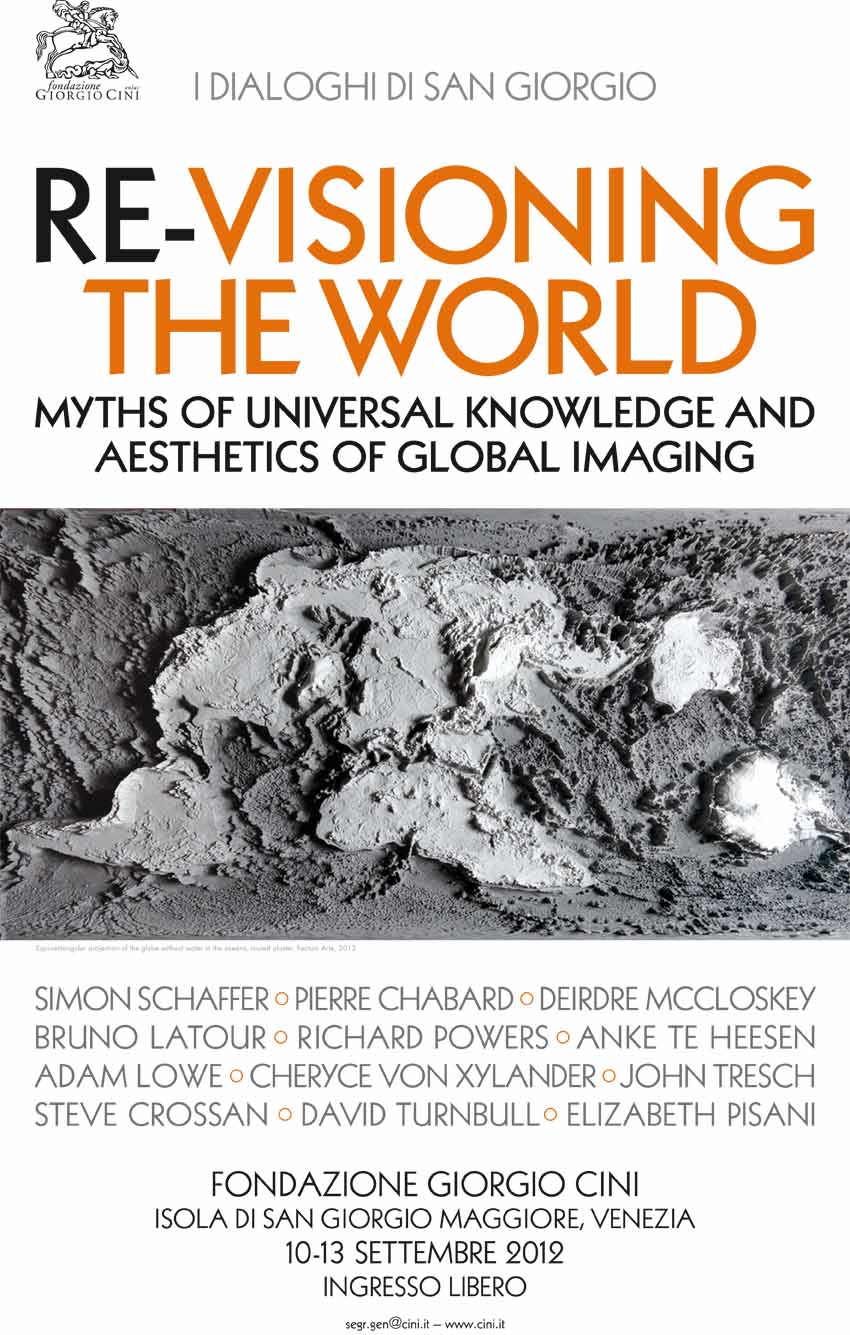
RE-VISIONING THE WORLD. Myths of universal knowledge and the aesthetics of the global imaginaning

This year’s “dialogue” on San Giorgio is inspired by an awareness of the urgent need to refl ect on the relationship between knowledge and power. The new information technologies seem to offer different opportunities for global connections and knowledge. These technologies are usually accompanied by new “great narrations” that highlight the myths of universal knowledge and perfect transparency, conveying a kind of moral lesson: all our problems could be resolved, if only every thing about everything everywhere were or could be known. This is how the virtues of responsibility, accessibility and control moralise the world of global databases. Yet we cannot pass over in silence the serious risks that accompany this new order of knowledge. This is especially true of the expropriation or suppression of other virtues – the tacit, the implied and the concealed – and private forms of know ledge and skills. Another threat comes from the big companies in the sector, which increasingly control the systems responsibility – exploit them for their own ends. The critical nature of the relation between knowledge and power is certainly nothing new. But the features of the current situation mean that an in-depth analysis of this relationship is particularly urgent. For some time now it has often been said that we must think globally and act locally. But it is diffi cult to understand how much local actions matter and it is equally diffi cult to think simultaneously on a global scale. The dialogue will consider the aesthetics of global knowledge at a time of crisis and the positive features, merits and fl aws, and pros and cons of different world visions which oppose the particular to the universal, the tangible to the abstract, and intellectual descriptions to aesthetic representations of the world. There are many long stories of projects that have attempted to reduce the globe to a scale that would highlight contents and connections: maps of cities, landscapes, globes, collections, museums and encyclopaedias; the theme of the ark seen as the treasure box of the universe but also as a means to survival; the Modernist projects to create universal languages, exhibitions and data systems capable of embracing the whole world. Often crucial in these attempts is the claim that a better representation of the world will make the world better: as if in a corrective mirror, the world would be refl ected and at the same time improved. These projects belong, therefore, to the history of utopias. A remote island enables a community to construct a miniature ideal world. Propitious links between the island and the mainland help the ideal to become a resource elsewhere. The Dialogo brings together on an island some of those people who are deeply interested in the enigmas and prospects of these “political arts”. The Dialogo raises the issue of the kind of scale on which these political arts of representation can function. The participants will explore the possible combinations of microand macrocosmic images of the world, the way in which shifts of scale to the immediate, the local and the miniaturised may turn out to be resources for the global or the worldwide. These “re-visions” will be realistic and will make no claim to provide comprehensive explanations or defi nitive answers to a basic question: as an alternative to forms of reductive abstraction, which involves removing characteristic features of the world, can we focus on a process of “condensation” which achieves its own aims by composing, adding and transforming, in the same way that physical condensation transforms the of global knowledge and may – in the name of universal knowledge and transparent atmosphere into rivers and streams? The island of San Giorgio Maggiore is an ideal place for a dialogue because of what distinguishes it from other utopias. Instead of dogmatically presupposing that answers already exist, the Giorgio Cini Foundation offers the opportunity to make a collective effort in the search for better questions. Participants: Simon Schaffer, Adam Lowe, Bruno Latour, Deidre McCloskey, Steve Crossan, Anke Te Heesen, David Turnbull, Cheryce von Xylander, John Tresch, Richard Powers, Pierre Chabard and Elizabeth Pisani. The Dialogo di San Giorgio will be opened by a special event to be held at 6 pm on Monday 10 September. A performance of music from Mauricio Kagel’s Die Stücke der Windrose and readings from works by Jorge Luis Borges, Italo Calvino and Lewis Carroll will provide the opportunity to explore musical and literary worlds in a geographical key.
